Battle of Berlin Unknown War
The war ended. Everyone understood this - both the generals of the Wehrmacht and their opponents. Only one person - Adolf Hitler - against all odds continued to hope for the strength of the German spirit, forweapon", And most importantly - the split between their enemies. The reasons for this were - despite the agreements reached in Yalta, Britain and the United States did not particularly want to cede Berlin to the Soviet troops. Their armies moved forward almost unchecked. In April, 1945 th they broke into the center of Germany, depriving the Wehrmacht of its “forge” - the Ruhr basin - and getting the opportunity to throw at Berlin. At the same time, the 1 of the Belorussian Front of Marshal Zhukov and the 1 of the Ukrainian Front of Konev froze in front of a powerful line of German defense on the Oder. The 2 Belorussian Front of Rokossovsky finished off the remnants of the enemy troops in Pomerania, and the 2 and 3 Ukrainian Front were advancing towards Vienna.
On April 1, Stalin convened a meeting of the State Defense Committee in the Kremlin. The participants were asked one question: “Who will take Berlin - us or the Anglo-Americans?” “Berlin will be taken by the Soviet Army,” Konev was the first to respond. He, the ever-present rival of Zhukov, was not taken aback by the question of the Supreme - he showed the GKO members a huge layout of Berlin, where the goals of future strikes were precisely indicated. The Reichstag, the imperial chancellery, the building of the Ministry of Internal Affairs - all these were powerful centers of defense with a network of bomb shelters and secret passages. The capital of the Third Reich was surrounded by three lines of fortifications. The first passed 10 km from the city, the second - on its outskirts, the third - in the center. Berlin was defended by selected units of the Wehrmacht and SS troops, to help which the last reserves were urgently mobilized - 15-year-old members of the Hitler Youth, women and old people from the Volkssturm (people's militia). Around Berlin, in the army groups Wisla and Center there were up to 1 million people, 10,4 thousand guns and mortars, 1,5 thousand tanks.
For the first time since the beginning of the war, the superiority of the Soviet troops in manpower and equipment was not only significant, but overwhelming. 2,5 million soldiers and officers, 41,6 thousand guns, more than 6,3 thousand tanks, 7,5 thousand planes were to attack Berlin. The main role in the offensive plan approved by Stalin was assigned to the 1 of the Byelorussian Front. Zhukov was supposed to attack the defense line on the Zelow Heights, which rose above the Oder, blocking the road to Berlin from the Kyustra bridgehead. The Konev Front was to force Neisse and strike the Reich capital with the forces of the tank armies Rybalko and Lelyushenko. It was planned that in the west he would reach the Elbe and, together with the Rokossovsky front, would unite with the Anglo-American troops. The Allies were informed about the Soviet plans, and they agreed to stop their armies on the Elbe. The Yalta agreements had to be implemented, and it also avoided unnecessary losses.
The offensive was scheduled for April 16. To make it unexpected for the enemy, Zhukov ordered to advance early in the morning, in the dark, blinding the Germans with the light of powerful searchlights. At five in the morning, three red missiles gave the signal for an attack, and after a second, thousands of guns and the Katyushas opened up a storm of such strength that the eight-kilometer space turned out to be plowed overnight. “Hitler's troops were literally sunk in a continuous sea of fire and metal,” Zhukov wrote in his memoirs. Alas, on the eve of the captured Soviet soldier revealed the date of the future offensive to the Germans, and they managed to withdraw the troops to the Zelow Heights. From there began aimed shooting at Soviet tanks, which, wave after wave, went on a breakthrough and died in a through-sweep field. While the enemy's attention was riveted on them, the soldiers of the 8 Guards Army of Chuikov managed to move forward and occupy the frontiers near the outskirts of the village of Zelov. By evening, it became clear: the planned pace of the attack is disrupted.
At the same time, Hitler addressed the Germans with an appeal, promising them: “Berlin will remain in German hands,” and the Russian offensive will “choke on blood”. But very few people believed in it. People with fear listened to the sounds of cannon cannonade, which added to the already familiar bomb breaks. The remaining residents - there were at least 2,5 million - were forbidden to leave the city. Losing a sense of reality, the Fuhrer decided: if the Third Reich perishes, all Germans should share his fate. Goebbels' propaganda intimidated the inhabitants of Berlin with the atrocities of the “Bolshevik hordes”, urging them to fight to the end. The headquarters of the defense of Berlin, which ordered the population to prepare for fierce battles on the streets, in homes and underground communications, was created. Each house was planned to turn into a fortress, for which all the remaining residents were forced to dig trenches and equip firing positions.
At the end of the day on April 16, Zhukov was called by the Supreme. He dryly reported that Konev's overcoming of Neisse “happened without difficulties”. Two tank armies broke through the front of Cottbus and rushed forward, without stopping the offensive, even at night. Zhukov had to promise that during April 17 he would take unfortunate heights. In the morning 1-I tank army of General Katukov again moved forward. And again, the "thirty-four", which passed from Kursk to Berlin, burned like candles from the fire of the "faust-guns". By evening, parts of Zhukov advanced only a couple of kilometers. Meanwhile, Konev reported to Stalin about new successes, announcing his readiness to take part in the storming of Berlin. The silence on the phone and the deaf voice of the Supreme: “I agree. Turn tank armies on Berlin ". On the morning of April 18, Rybalko and Lelyushenko’s army rushed north to Teltow and Potsdam. Zhukov, whose vanity suffered cruelly, threw his troops into a last desperate attack. In the morning 9-I German army, which was the main blow, could not stand it and began to roll back to the west. The Germans were still trying to go on the counterattack, but the next day they retreated along the whole front. From this point on, nothing could delay the outcome.
 Friedrich Hitzer, German writer, translator:
Friedrich Hitzer, German writer, translator: -My answer regarding the assault on Berlin is extremely personal, not a military strategist. In 1945, I was 10 years old, and, as a child of the war, I remember how it ended, how I felt the defeated people. In this war, and participated in my father and next of kin. The latter was a German officer. Returning from captivity to 1948, he resolutely told me that if this happened again, he would go to war again. And on January 9, 1945, on my birthday, I received a letter from the front from my father, who also wrote with determination that you need to "fight, fight and fight the terrible enemy in the east, otherwise we will be taken away to Siberia." After reading these lines as a child, I was proud of the courage of my father - “the liberator from the Bolshevik yoke”. But quite a bit of time passed, and my uncle, that same German officer, told me many times: “We were deceived. See that this does not happen to you. ” The soldiers realized that this was not the war. Of course, we were not “deceived” by all. One of his father’s best friends back in the 30s warned him: Hitler is terrible. You know, any political ideology of superiority of one over the other, absorbed by society, is akin to drugs ...
The meaning of the assault, and in general the final of the war, became clear to me later. The assault on Berlin was necessary - he saved me from being a German conqueror. If Hitler had won, I probably would have become a very unlucky person. His goal of world domination is alien and incomprehensible to me. As an action, taking Berlin was scary for the Germans. But really it was happiness. After the war, I worked in a military commission dealing with German prisoners of war, and I became convinced of this once again.
Recently, I met with Daniel Granin, and we talked for a long time about the people who surrounded Leningrad ...
And then, during the war, I was afraid, yes, I hated the Americans and the British, who practically bombed my home town Ulm to the ground. This feeling of hatred and fear lived in me until I was in America.
I remember well how, evacuated from the city, we lived in a small German village on the banks of the Danube, which was the “American zone”. Our girls and women then blackened themselves with pencils in order not to be raped ... Every war is a terrible tragedy, and this war was especially terrible: today they talk about 30 millions of Soviet and 6 millions of German victims, as well as millions of dead people from other nations.
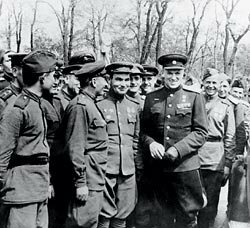 Last birthday
Last birthday 19 April another competitor appeared in the race for Berlin. Rokossovsky reported to Stalin that the 2 of the Belarusian Front was ready to storm the city from the north. On the morning of this day, the 65-I army of General Batov forced a broad course of the Western Oder and moved to Prenzlau, cutting through the German army group "Vistula". At this time, Konev's tanks easily, as in a parade, moved northward, almost without meeting resistance and leaving the main forces far behind. Marshal deliberately took the risk, hurrying to go to Berlin before Zhukov. But the troops of 1-Byelorussian were already approaching the city. His formidable commander issued an order: “Not later than 4 in the morning on April 21, at any cost, break through to the suburbs of Berlin and immediately send a message to Stalin and to the press about this.”
20 April, Hitler celebrated his last birthday. Immersed in the 15 meters in the ground, a bunker under the imperial office gathered selected guests: Goering, Goebbels, Himmler, Bormann, the top of the army and, of course, Eva Braun, who was listed as the “secretary” of the Fuhrer. Companions offered their leader to leave the doomed Berlin and move to the Alps, where a secret refuge had already been prepared. Hitler refused: "I am destined to conquer or die with the Reich." However, he agreed to withdraw from the capital command of the troops, dividing it into two parts. The North was under the control of Grand Admiral Dönitz, to whom Himmler went with his headquarters. South of Germany was to defend Goering. At the same time, a plan emerged to defeat the Soviet offensive by the forces of Steiner’s army from the north and Wenk from the west. However, this plan was doomed from the very beginning. Both the Wenk 12 Army and the remnants of the SS General Steiner units were exhausted in battle and were not capable of action. Army Group “Center”, on which hopes were also pinned, waged heavy fighting in the Czech Republic. Zhukov prepared a “gift” for the German leader - in the evening his army approached the city border of Berlin. The first shells of long-range guns hit the center of the city. The next morning, General Kuznetsov’s 3 Army entered Berlin from the northeast, and Berzarin's 5 Army from the north. Katukov and Chuykov were advancing from the east. The streets of the dreary Berlin outskirts blocked barricades, "faustnik" fired from the gateways and windows of the houses.
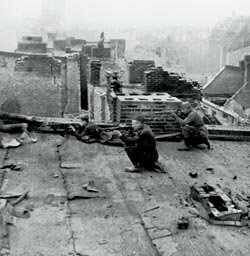 Zhukov ordered not to waste time on the suppression of individual firing points and rush forward. Meanwhile, Rybalko’s tanks approached the headquarters of the German command in Zossen. Most of the officers fled to Potsdam, and the chief of staff, General Krebs, went to Berlin, where on April 22 the last military meeting was held with Hitler in 15.00. Only then did the Führer decide to say that no one could save the besieged capital. The reaction was stormy: the leader broke out in threats against the "traitors", then collapsed on a chair and groaned: "It's over ... the war is lost ..."
Zhukov ordered not to waste time on the suppression of individual firing points and rush forward. Meanwhile, Rybalko’s tanks approached the headquarters of the German command in Zossen. Most of the officers fled to Potsdam, and the chief of staff, General Krebs, went to Berlin, where on April 22 the last military meeting was held with Hitler in 15.00. Only then did the Führer decide to say that no one could save the besieged capital. The reaction was stormy: the leader broke out in threats against the "traitors", then collapsed on a chair and groaned: "It's over ... the war is lost ..." And yet the Nazi elite were not going to give up. It was decided to completely stop the resistance to the Anglo-American troops and abandon all forces against the Russians. All the military capable of holding weapons, should be sent to Berlin. The Fuhrer still pinned his hopes on Wenk's 12 army, which was to join the Busse 9 army. To coordinate their actions, the command, led by Keitel and Jodl, was withdrawn from Berlin to the town of Kramnitz. In the capital, apart from Hitler himself, only General Krebs, Borman, and Goebbels, appointed by the head of defense, remained of the leaders of the Reich.
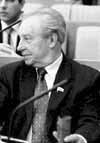 Nikolai Sergeevich Leonov, Lieutenant-General of the Foreign Intelligence Service:
Nikolai Sergeevich Leonov, Lieutenant-General of the Foreign Intelligence Service:-Berlin operation is the penultimate BOB operation. It was conducted by three fronts from 16 to 30 on April 1945 of the year - with raising the flag over the Reichstag and the end of resistance - on the evening of May 2. Pros and cons of this operation. Plus - the operation took place quite quickly. After all, the attempt to take Berlin was actively promoted by the leaders of the allied armies. This is reliably known from Churchill's letters.
Cons - almost everyone who participated recalls that there were too many victims and, possibly, without objective necessity. The first reproaches of Zhukov - he stood at the shortest distance from Berlin. His attempt to enter from the east with a frontal strike is regarded by many participants in the war as an erroneous decision. It was necessary to cover Berlin from the north and the south with a ring and force the enemy to capitulate. But the marshal went directly. Regarding the April 16 artillery operation, the following can be said: Zhukov brought the idea of using searchlights from Khalkhin-Gol. It was there that the Japanese launched a similar attack. Zhukov repeated the same technique: but many military strategists claim that the searchlights had no effect. As a result of their use, a mix of fire and dust has turned out. This frontal attack was unsuccessful and poorly thought out: when our soldiers marched through the trenches, there were few German corpses. So the upcoming units for nothing shot more 1 000 ammunition cars. Stalin specially arranged competition between marshals. After all, Berlin was finally surrounded by April 25. One could not resort to such sacrifices.
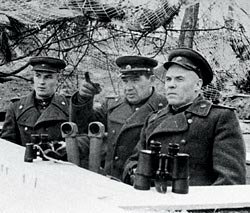 City on fire
City on fire 22 April 1945 of the year in Berlin appeared Zhukov. His armies - five rifle and four tank - destroyed the capital of Germany from all types of weapons. Meanwhile, Rybalko’s tanks approached the city’s boundaries, taking up a bridgehead in the Teltow area. Zhukov gave his avant-garde - the armies of Chuikov and Katukov - an order to force Spree, no later than 24, to be in Temmelhof and Marienfeld - the central areas of the city. For street battles, assault detachments were quickly formed from fighters from different units. In the north, General Perkhorovich's 47 Army crossed the Havel River by chance on a surviving bridge and headed west, preparing to join up with Konev’s units and close the encirclement ring. Having occupied the northern areas of the city, Zhukov finally excluded Rokossovsky from among the participants in the operation. From that moment until the end of the war, the 2 of the Byelorussian Front was engaged in defeating the Germans in the north, drawing off a large part of the Berlin grouping.
The glory of the winner of Berlin passed Rokossovsky, she passed and Konev. Stalin's directive, received in the morning of April 23, ordered 1 Ukrainian troops to stop at Anhalter station - literally a hundred meters from the Reichstag. To occupy the center of the enemy capital, the Supreme entrusted Zhukov, noting thereby his invaluable contribution to the victory. But it was still necessary to reach Ankhalter. Rybalko and his tanks froze on the shores of the deep Teltow Canal. Only with the approach of artillery, which had suppressed the German firing points, were the vehicles able to cross the water barrier. On April 24, Chuikov’s scouts made their way westward through the Schönefeld airfield and met Rybalko’s tankmen there. This meeting divided the German forces in half - about 200 thousands of soldiers were surrounded in a wooded area to the south-east of Berlin. Before 1, this group tried to break through to the west, but was cut into pieces and almost completely destroyed.
And the shock forces of Zhukov continued to rush to the center of the city. Many fighters and commanders had no experience of fighting in a big city, which led to huge losses. The tanks were moving in columns, and it was worthwhile to knock the front in, as the whole column became easy prey for the German "faustnik". It was necessary to resort to merciless, but effective tactics of hostilities: first, the artillery fired heavy fire at the target of a future offensive, then volleys “Katyushas” drove all the living in shelters. After that, tanks went ahead, destroying the barricades and carrying houses from where shots were heard. Only then came the infantry. During the battle, nearly two million gun shots fell on the city - 36 thousand tons of deadly metal. From Pomerania, the fortress guns were delivered by rail, firing half a ton in the center of Berlin.

But even this firepower did not always cope with the thick walls of buildings built in the 18th century. Chuikov recalled: "Our guns sometimes made up to a thousand shots on one square, on a group of houses, even on a small garden." It is clear that at the same time no one thought about the civilian population trembling with fear in bomb shelters and flimsy basements. However, the main blame for his suffering lay not on the Soviet troops, but on Hitler and his entourage, who, with the help of propaganda and violence, did not allow residents to leave the city, which turned into a sea of fire. After the victory, it was estimated that 20% of the houses in Berlin were completely destroyed, and 30% - partially. April 22 for the first time in stories the city telegraph was closed, having received the last message from the Japanese allies - “we wish good luck”. The water and gas turned off, the transport stopped walking, the delivery of food stopped. Starving Berliners, not paying attention to the continuous shelling, robbed freight trains and shops. They were no longer afraid of the Russian shells, but of the SS patrols, who seized men and hung them on trees like deserters.
Police and Nazi officials began to scatter. Many tried to get to the west to surrender to the Anglo-Americans. But the Soviet units were already there. 25 April in 13.30 they came to the Elbe and met at the town of Torgau with the tank crews of the 1 American Army.
On this day, Hitler entrusted the defense of Berlin to the general tankman Weidling. Under his command were 60 thousand soldiers who were opposed by 464 thousand Soviet troops. The armies of Zhukov and Konev met not only in the east, but also in the west of Berlin, in the Ketzin area, and now they were separated from the city center by the entire 7 – 8 kilometers. 26 April, the Germans made the last desperate attempt to stop the attackers. Fulfilling an order from the Führer, the Wenk 12 Army, in which there were thousands of people before 200, struck from the west a blow at the Konev 3 and 28 armies. Even for this fierce battle, the fierce battle continued for two days, and by the evening of 27, Wen had to withdraw to the previous positions.
On the eve of the warriors of Chuikov, they occupied the airfields of Gatov and Tempelhof, executing Stalin's order to prevent Hitler from leaving Berlin at any cost. The Supreme was not going to give the one who treacherously deceived him in 1941 to slip away or surrender to the allies. Relevant orders were given about other Nazi leaders. There was also one more category of Germans who were strenuously searched for - specialists in nuclear research. Stalin knew about the work of the Americans on the atomic bomb and was going to create his own as soon as possible. It was already necessary to think about peace after the war, where the Soviet Union was to occupy a worthy, blood-paid place.
Meanwhile, Berlin continued to choke in the smoke of the fires. The Volksstrummer Edmund Heckscher recalled: “There were so many fires that night turned into a day. It was possible to read a newspaper, but the newspapers in Berlin no longer came out. ” The roar of guns, shooting, explosions of bombs and shells did not stop for a minute. Clouds of smoke and brick dust clouded the center of the city, where, deep under the ruins of the imperial office, Hitler again and again tormented his subordinates with the question: “Where is Wenk?”
27 April three quarters of Berlin was in Soviet hands. In the evening, Chuikov’s shock forces reached the Landwehr Canal, a mile and a half from the Reichstag. However, the way they were blocked by selected parts of the SS, who fought with particular fanaticism. The 2 tank army of Bogdanov was stuck in the Tiergarten area, the parks of which were littered with German trenches. Each step here was given with difficulty and considerable blood. Rybalko's tankers, who had made an unprecedented rush from the west to the center of Berlin via Wilmersdorf, had chances again.
By nightfall, the Germans had a bandwidth of 2 – 3 a kilometer wide and up to 16 in their hands. The first batches of prisoners stretched to the rear - still small ones, leaving the basements and porches of the houses with raised arms. Many are deafened by the incessant rumble, others who have gone mad, laughed wildly. The civilian population continued to hide, fearing revenge from the victors. The Avengers, of course, were - could not be after what the Nazis did on Soviet soil. But there were those who, risking their lives, pulled German old men and children out of the fire, and shared their rations with their soldiers. The feat of sergeant Nikolai Masalov, who rescued a three-year-old German girl from a ruined house on the Landwehr Canal, went down in history. It depicts him in the famous statue in Treptow Park - the memory of Soviet soldiers, who kept humanity in the fire of the most terrible of wars.
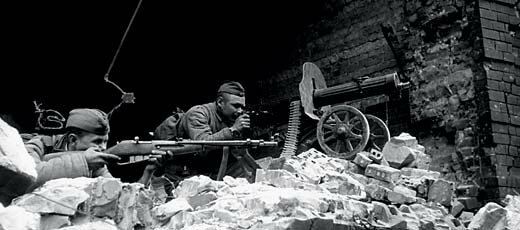
Even before the end of the fighting, the Soviet command took measures to restore normal life in the city. On April 28, General Berzarin, appointed by the commandant of Berlin, issued an order to dissolve the National Socialist Party and all its organizations and transfer all power to the military commander's office. In the areas cleared of the enemy, the soldiers had already begun to extinguish fires, to demine buildings, to bury numerous corpses. However, to establish a normal life was possible only with the assistance of the local population. Therefore, even on April 20, the General Headquarters demanded that the military commanders change their attitude towards German prisoners and civilians. The directive put forward a simple justification for such a step: "A more humane attitude towards the Germans will reduce their perseverance in defense."
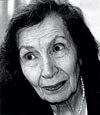 Former Sergeant of the 2 Article, member of the International PEN Club (International Writers' Organization), German writer, translator Yevgeny Katsev:
Former Sergeant of the 2 Article, member of the International PEN Club (International Writers' Organization), German writer, translator Yevgeny Katsev: -The greatest of our holidays is approaching, and in my soul the cats are scrubbing. Recently (in February) of this year I was at a conference in Berlin, seemingly dedicated to this great, I think, not only for our people, date, and made sure that many have forgotten who started the war and who won it. No, this stable phrase “win the war” is completely inappropriate: you can win and lose in the game - in the war, they either win or lose. For many Germans, the war is only the horrors of those few weeks when it was on their territory, as if our soldiers had come there of their own accord, and not fighting fought their way to the west of the long 4 of the year across their burnt and trampled earth. It means that Konstantin Simonov was not so right, believing that there is no such thing as grief. It happens, even as it happens. And if they forgot who put an end to one of the worst wars, he defeated German fascism, where you can remember who took the capital of the German Reich - Berlin. Our Soviet Army, our Soviet soldiers and officers, took it. Throughout, entirely, fighting for every district, quarter, house, from the windows and doors of which, until the last moment, shots rang out.
After that, a whole bloody week after the capture of Berlin, 2 of May, our allies appeared, and the main trophy, as a symbol of joint victory, was divided into four parts. On four sectors: Soviet, American, English, French. With four military commandant's offices. Four or four, even more or less equal, but in general, Berlin was divided into two completely different parts. For the three sectors soon merged, and the fourth — the eastern — and, as usual, the poorest — turned out to be isolated. Such remained, although later gained the status of the capital of the GDR. To us, the Americans, in return, “generously” pushed away the Thuringia they occupied. The edge is good, only the disappointed residents have long concealed a grudge for some reason not against the apostates-Americans, but against us, the new invaders. Here is an aberration ...
As for looting, our soldiers did not come there by themselves. And now 60 years later spread all sorts of myths, growing into ancient sizes ...
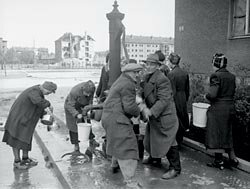 Reich cramps
Reich cramps The fascist empire collapsed before our eyes. 28 On April, Italian partisans caught the dictator Mussolini, who was trying to escape, and shot him. The next day, General von Witithoff signed an act of surrender to the Germans in Italy. Hitler found out about the execution of the duce at the same time as the other bad news: his closest associates, Himmler and Goring, began separate negotiations with Western allies, bargaining for their lives. The Fuhrer was beside himself with rage: he demanded to immediately arrest and execute the traitors, but this was no longer in his power. We managed to recoup on Himmler's deputy, General Fegeleine, who was fleeing from a bunker, - a detachment of SS men grabbed him and shot him. Even the fact that he was the husband of Eva Braun’s sister did not save the general. On the evening of the same day, Commandant Weidling reported that there was only two days left in the city, and there was no fuel at all.
General Chuikov received from Zhukov the task of uniting from the east with forces advancing from the west through Tiergarten. Potsdamer-bridge, leading to the station Anhalter and Wilhelmstrasse, became an obstacle for the soldiers. The sappers managed to save him from the explosion, but the tanks that entered the bridge were shot down with well-aimed shots from the faust-cartridges. Then the tankers tied one of the tanks with sandbags, doused it with diesel fuel and let it go. From the first shots, fuel flared, but the tank continued to move forward. A few minutes of enemy confusion was enough for the rest of the first tank to move. By the evening of 28, Chuikov approached the Tiergarten from the southeast, while Rybalko tanks entered the region from the south. In the north of the Tiergarten, the 3 Army of Perepelkin liberated Moabit Prison, from where 7 thousands of prisoners were released.
The city center has become a real hell. From the heat there was nothing to breathe, the stones of the buildings cracked, the water in the ponds and canals boiled. There was no front line - a desperate battle followed every street, every house. In the dark rooms and on the stairs - the electricity in Berlin has long been extinguished - melee fights broke out. Early in the morning of April 29, the men of 79 of General Perevertkin’s rifle corps approached the huge building of the Ministry of Internal Affairs - “Himmler's house”. Having shot guns at the barricades at the entrance, they managed to break into the building and capture it, which made it possible to come close to the Reichstag.
Meanwhile, nearby, in his bunker, Hitler dictated a political will. He excluded the “traitors” of Goering and Himmler from the Nazi party and accused the entire German army of failing to keep “a commitment to duty to death”. Power over Germany was handed over to the "president" Dönitz and the "chancellor" Goebbels, and the command of the army to field marshal Scherner. Towards evening the official Wagner, brought by the SS men from the city, performed the civil ceremony of the Fuhrer and Eva Braun. Witnesses were Goebbels and Borman, who stayed for breakfast. During the meal, Hitler was depressed, muttering something about the death of Germany and the triumph of the "Jewish Bolsheviks." During breakfast, he presented two secretaries with ampoules of poison and ordered to poison his beloved sheepdog Blondi. Outside the walls of his office, the wedding was quickly turning into booze. One of the few sober employees remained the personal pilot of Hitler, Hans Bauer, who offered to take out his boss to any part of the world. Fuhrer once again refused.
On the evening of April 29, General Weidling reported to Hitler for the last time. The old soldier was frank - tomorrow the Russians will be at the entrance to the office. Ammunition ends, reinforcements nowhere to wait. Wenk's army was thrown back to the Elbe, and most of the other units are completely unknown. Need to capitulate. This opinion was confirmed by Colonel SS Monke, who had previously been fanatically fulfilling all the orders of the Fuhrer. Hitler banned the surrender, but allowed the soldiers in small groups to leave the encirclement and make their way to the west.
Meanwhile, Soviet troops occupied one building after another in the center of the city. The commanders could hardly navigate through the maps - there was not indicated that the jumble of stones and twisted metal, which used to be called Berlin. After the capture of "Himmler's house" and the town hall, the attackers had two main goals - the imperial office and the Reichstag. If the first was the real center of power, then the second was its symbol, the tallest building in the German capital, where the Victory banner was to be planted. The banner was already ready - it was transferred to one of the best units of the 3 Army, the battalion of Captain Neustroyev. On the morning of April 30, the units approached the Reichstag. With regard to the office, to her decided to break through the zoo in Tiergarten. In the destroyed park, soldiers rescued several animals, including a mountain goat, who was braced with the German Iron Cross hung around its neck. Only in the evening was taken the center of defense - a seven-story reinforced concrete bunker.
Next to the zoo, the Soviet assault troops were attacked by SS soldiers from the ruined subway tunnels. Pursuing them, the fighters penetrated the ground and found the moves leading to the office. With the move came the plan to "finish off the fascist beast in his lair." The scouts went deeper into the tunnels, but after a couple of hours water gushed toward them. According to one of the versions, after learning of the approach of the Russians to the office, Hitler ordered to open the floodgates and to launch the Spree in the subway, where in addition to Soviet soldiers there were tens of thousands of wounded, women and children. Berliners who survived the war recalled that they had heard the order to urgently leave the subway, but because of the crush that occurred, few were able to get out. Another version denies the existence of the order: the water could break through the subway because of the continuous bombardment that destroyed the walls of the tunnels.
If the Fuhrer ordered flooding his fellow citizens, this was the last of his criminal orders. On the afternoon of April 30, he was informed that the Russians were in Potsdamer Platz Square, a block from the bunker. Shortly thereafter, Hitler and Eva Braun said goodbye to their comrades and retired to their room. In 15.30, a shot rang out from there, after which Goebbels, Borman, and a few others entered the room. The Fuhrer with a gun in his hand was lying on the couch with a face covered with blood. Eva Brown did not disfigure herself - she took poison. They carried the corpses into the garden, where they put them in a funnel from the projectile, doused them with gasoline and set them on fire. The funeral ceremony did not last long - Soviet artillery opened fire, and the Nazis hid in a bunker. Later, the burned bodies of Hitler and his girlfriends were discovered and transported to Moscow. For some reason, Stalin did not show the world evidence of the death of his worst enemy, which gave rise to many versions of his salvation. Only in 1991, Hitler's skull and his parade uniform were found in the archive and demonstrated to all those who wish to see these grim testimonies of the past.
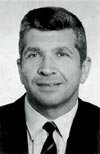 Zhukov Yury Nikolaevich, historian, writer:
Zhukov Yury Nikolaevich, historian, writer: -The winners are not judged. And that's all. In 1944, it turned out to be quite possible without serious battles, with the efforts of diplomacy above all to remove Finland, Romania, Bulgaria from the war. Even more favorable for us is the situation 25 April 1945. That day on the Elbe, near the city of Torgau, the troops of the USSR and the USA met, and the complete encirclement of Berlin was completed. From that moment on, the fate of Nazi Germany was decided. Victory has become inevitable. Only one thing remained unclear: when exactly the complete and unconditional surrender of the agonizing Wehrmacht will follow. Zhukov, removing Rokossovsky, took over the leadership of the storming of Berlin. Could just hourly compress the ring of blockade.
To force Hitler and his minions to commit suicide not on April 30, but a few days later. But Zhukov did otherwise. During the week ruthlessly sacrificed thousands of soldiers' lives. Forced parts of the 1 of the Byelorussian Front to conduct bloody battles for each quarter of the German capital. For every street, every house. He achieved the surrender of the Berlin garrison 2 in May. But if this surrender did not follow 2 May, but, say, 6 or 7, it would be possible to save tens of thousands of our soldiers. Well, Zhukov would have won the glory of a winner like that.
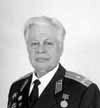 Molchanov Ivan Gavrilovich, a participant in the storming of Berlin, a veteran of the 8 of the Guards Army of the 1 of the Belarusian Front:
Molchanov Ivan Gavrilovich, a participant in the storming of Berlin, a veteran of the 8 of the Guards Army of the 1 of the Belarusian Front:-After the battles at Stalingrad, our army under the command of General Chuikov passed the whole of Ukraine, the south of Belarus, and then went through Berlin to Poland, on the approaches to which a very difficult Kustrin operation took place. I, an artillery reconnaissance unit, was then 18 years old. I still remember how the earth was trembling and a squall of shells plowed it up and down ... As after a powerful artillery preparation on the Zelovsky Heights, infantry went into battle. The soldiers, who were driving the Germans from the first line of defense, said later that after blinding by searchlights that were used in this operation, the Germans fled by clutching their heads. Many years later, during a meeting in Berlin, German veterans who took part in this operation told me that at that time they thought that the Russians had used a new secret weapon.
After the Zelovskiy Heights, we moved directly to the German capital. Due to the flood, the roads were so muddy that both the equipment and the people moved with difficulty. It was impossible to dig trenches: at a depth of water protruded from the bayonet of a shovel. We reached the ring road by the twentieth of April and soon found ourselves on the outskirts of Berlin, where continuous fighting for the city began. The SS men had nothing to lose: they solidified thoroughly and well in advance residential buildings, subway stations, and various institutions. When we entered the city, we were horrified: its center was completely bombed by the Anglo-American aviation, and the streets are littered so that the equipment barely moved along them. We moved with a map of the city — we found the streets and quarters marked on it with difficulty. On the same map, in addition to objects - firing targets, museums, book depositories, and medical facilities were forbidden to shoot at.
In the battles for the center, the losses were also borne by our tank units: they became easy prey for the German faustpatronshchik. And then the command applied a new tactic: first, the artillery and flamethrower destroyed the enemy firing points, and after it the tanks cleared the way for the infantry. At this point, only one gun remained in our unit. But we continued to act. When approaching the Brandenburg Gate and the Anhalt station, they received an order “not to shoot” - the accuracy of the battle here was such that our shells could get into their own. By the end of the operation, the remnants of the German army were divided into four parts, which began to be pressed into rings.
The shooting ended on May 2. And suddenly there was such a silence, which was impossible to believe. Residents of the city began to leave the shelters, they looked at us frowningly. And here, in establishing contacts with them, their children helped. The ubiquitous guys, 10 — 12 years came up to us, we treated them to cookies, bread, sugar, and when we opened the kitchen, we began to feed them with cabbage soup, porridge. It was a strange sight: the skirmishes were resumed somewhere, the volleys of guns were heard, and our kitchen had a queue for porridge ...
And soon a squadron of our horsemen appeared on the streets of the city. They were so clean and festive that we decided: “Probably somewhere near Berlin, they were specially dressed, prepared ...” This is an impression, as well as a visit to the destroyed Reichstag GK Zhukov - he drove up in his unbuttoned overcoat, smiling, - crashed into my memory forever. There were, of course, other memorable moments. In battles for the city, our battery had to relocate to another firing point. And then we came under German artillery attack. Two of my comrades jumped into the pit, ruined by a projectile. And without knowing why, I lay down under the truck, where in a few seconds I realized that the car above me was full of shells. When the shelling was over, I got out from under the truck and saw that my comrades were killed ... Well, I, it turns out, was born that day the second time ...
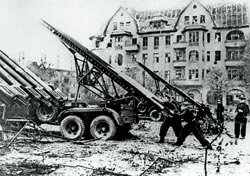 The Last Stand
The Last Stand The assault on the Reichstag was conducted by the 79 th infantry corps of General Perevertkin, reinforced by shock groups of other units. The first onslaught of 30 in the morning was repulsed - up to 1,500 SS men were dug in in the huge building. In 18.00 followed by a new assault. For five hours, the fighters, meter by meter, moved forward and upward, onto the roof, adorned with giant bronze horses. To hoist the flag was instructed to sergeants Yegorov and Kantaria - they decided that Stalin would be pleased to participate in this symbolic act of his countryman. Only in 22.50 two sergeants reached the roof and, risking their lives, put a flag pole into the hole from the projectile at the very horse hooves. This was immediately reported to the front headquarters, and Zhukov phoned the Supreme to Moscow.
A little later came another news - the heirs of Hitler decided to go to the negotiations. This was announced by General Krebs, who appeared at Chuikov’s headquarters on 3.50 on the morning of May 1. He began with the words: "Today is the First of May, a great holiday of both our nations." To which Chuikov replied without unnecessary diplomacy: “Today is our holiday. It’s hard to say how things are going. ” Krebs told about Hitler's suicide and the desire of his successor Goebbels to conclude an armistice. A number of historians believe that these negotiations were to stretch time in anticipation of a separate agreement of the “government” Dönitz with the Western powers. But they did not reach the goal - Chuikov immediately reported to Zhukov, and he called Moscow, waking Stalin on the eve of the May Day parade. The reaction to Hitler's death was predictable: “Finished playing, scoundrel! It is a pity that we did not take him alive. " On the offer of a truce came the answer: only complete surrender. This was passed to Krebs, who replied: "Then you will have to destroy all the Germans." The response silence was more eloquent than words.
At 10.30, Krebs left headquarters, having had time to drink cognac and share memories with Chuikov, both commanding units at Stalingrad. Having received the final "no" of the Soviet side, the German general returned to his troops. Zhukov, after him, sent an ultimatum: if Goebbels and Bormann did not agree to an unconditional surrender before the 10 watch, the Soviet troops would inflict a blow that would leave “nothing but ruins” in Berlin. The Reich leadership did not give an answer, and in 10.40 Soviet artillery opened hurricane fire at the center of the capital.
The shooting did not stop all day - the Soviet units suppressed the German resistance centers, which weakened a little, but were still fierce. In different parts of the vast city, tens of thousands of soldiers and Volkssturm men were still fighting. Others, throwing weapons and tearing insignia, tried to go west. Among the latter was Martin Borman. Upon learning of Chuikov’s refusal to negotiate, he, along with a group of SS men, escaped from the office through an underground tunnel leading to the Friedrichstraße metro station. There he got out into the street and tried to hide from the fire behind a German tank, but he was shot down. The leader of the “Hitler Youth”, Aksman, who shamefully abandoned his young pets, later said that he had seen the dead body of “Nazi No. 2” under the railway bridge.
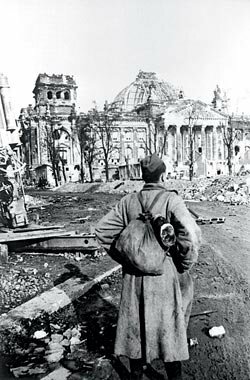 In 18.30, the soldiers of General Berzarin's 5 Army went to storm the last stronghold of Nazism - the imperial office. Prior to that, they managed to take the post office by storm, several ministries and a heavily fortified Gestapo building. Two hours later, when the first groups of attackers had already approached the building, Goebbels and his wife Magda followed their idol, taking poison. Before that, they asked the doctor to inject a lethal injection to their six children - they were told that they would give an injection that they would never get sick from. The children were left in the room, and Goebbels and his wife were taken to the garden and burned. Soon everyone who was downstairs - around 600 adjutants and SS men - rushed out: the bunker began to burn. Somewhere in its depths there was only General Krebs who shot a bullet in the forehead. Another Nazi commander, General Weidling, took charge and turned to Chuikov on the radio with consent to unconditional surrender. At one in the morning on May 2, German officers with white flags appeared on Potsdam Bridge. Their request was reported to Zhukov, who gave his consent. At 6.00, Weidling signed an order to surrender, addressed to all German troops, and he himself set an example to his subordinates. After this shooting in the city began to subside. From the basements of the Reichstag, from the ruins of houses and shelters came the Germans, who silently put weapons on the ground and were built into columns. They were watched by the writer Vasily Grossman, who accompanied the Soviet commandant Berzarin. Among the prisoners he saw were old men, boys and women who did not want to part with their husbands. The day was cold, light rain poured over the smoldering ruins. On the streets lay hundreds of corpses crushed by tanks. In the same place flags with a swastika and party cards were scattered around - Hitler's supporters were in a hurry to get rid of the evidence. In Tiergarten, Grossman saw a German soldier and a nurse on a bench - they sat hugging each other and did not pay any attention to what was going on around them.
In 18.30, the soldiers of General Berzarin's 5 Army went to storm the last stronghold of Nazism - the imperial office. Prior to that, they managed to take the post office by storm, several ministries and a heavily fortified Gestapo building. Two hours later, when the first groups of attackers had already approached the building, Goebbels and his wife Magda followed their idol, taking poison. Before that, they asked the doctor to inject a lethal injection to their six children - they were told that they would give an injection that they would never get sick from. The children were left in the room, and Goebbels and his wife were taken to the garden and burned. Soon everyone who was downstairs - around 600 adjutants and SS men - rushed out: the bunker began to burn. Somewhere in its depths there was only General Krebs who shot a bullet in the forehead. Another Nazi commander, General Weidling, took charge and turned to Chuikov on the radio with consent to unconditional surrender. At one in the morning on May 2, German officers with white flags appeared on Potsdam Bridge. Their request was reported to Zhukov, who gave his consent. At 6.00, Weidling signed an order to surrender, addressed to all German troops, and he himself set an example to his subordinates. After this shooting in the city began to subside. From the basements of the Reichstag, from the ruins of houses and shelters came the Germans, who silently put weapons on the ground and were built into columns. They were watched by the writer Vasily Grossman, who accompanied the Soviet commandant Berzarin. Among the prisoners he saw were old men, boys and women who did not want to part with their husbands. The day was cold, light rain poured over the smoldering ruins. On the streets lay hundreds of corpses crushed by tanks. In the same place flags with a swastika and party cards were scattered around - Hitler's supporters were in a hurry to get rid of the evidence. In Tiergarten, Grossman saw a German soldier and a nurse on a bench - they sat hugging each other and did not pay any attention to what was going on around them. In the afternoon, Soviet tanks began to drive through the streets, transmitting an order of surrender through loudspeakers. Near 15.00, the fighting finally stopped, and only in the western areas did the explosions roar - the SS who were trying to escape were chasing there. Over Berlin hung unusual, intense silence. And then it was broken by a new squall of shots. Soviet soldiers crowded on the steps of the Reichstag, on the ruins of the imperial office and shot again and again - this time in the air. Strangers threw themselves into each other’s arms, and danced right on the pavement. They could not believe that the war was over. Ahead, many of them had new wars, hard work, difficult problems, but they had already done the main thing in their life.
In the last battle of the Great Patriotic War, the Red Army crushed 95 enemy divisions. 150 killed thousands of German soldiers and officers, 300 thousands were captured. The victory came at a heavy price - in two weeks of the offensive, three Soviet fronts lost from 100 thousands to 200 thousands of people killed. Meaningless resistance claimed the lives of approximately 150 thousands of peaceful Berliners, much of the city was destroyed.
Chronicle of the operation
16 April, 5.00.
The troops of the 1 of the Byelorussian Front (Zhukov), after a powerful artillery bombardment, begin an offensive on the Zelow Heights at the Oder.
16 April, 8.00.
Parts of the 1 of the Ukrainian Front (Konev) force the Neisse River and move to the west.
18 April morning.
The tank armies of Rybalko and Lelyushenko turn north, in the direction of Berlin.
18 April evening.
The defense of the Germans on the Zelow Heights is broken. Parts of Zhukov begin to advance to Berlin.
19 April morning.
The troops of the 2 of the Byelorussian Front (Rokossovsky) force the Oder, dissecting German defenses north of Berlin.
20 April evening.
Zhukov’s armies approach Berlin from the west and northwest.
21 April, day.
Rybalko's tanks occupy the headquarters of the German troops in Zossen, south of Berlin.
22 April morning.
Army Rybalko occupies the southern outskirts of Berlin, and the army Perkhorovicha - the northern parts of the city.
24 April, day.
The meeting of the advancing troops of Zhukov and Konev in the south of Berlin. The Frankfurt-Gubensky group of Germans is surrounded by Soviet units, and its destruction has begun.
25 April, 13.30.
Parts of Konev reached the Elbe near the town of Torgau and met there with the 1 of the American army.
26 April morning.
Wenk's German army launches a counterstrike on the advancing Soviet units.
27 April evening.
After hard fighting, Wenk's army was abandoned.
28 April.
Soviet units surround the city center.
29 April, day.
The building of the Ministry of Internal Affairs and the town hall were taken by storm.
30 April, day.
Busy Tiergarten area with a zoo.
30 April, 15.30.
Hitler committed suicide in a bunker under the imperial office.
30 April, 22.50.
The Reichstag assault that lasted from the morning was completed.
1 May, 3.50.
The beginning of the unsuccessful negotiations of the German General Krebs with the Soviet command.
1 May, 10.40.
After the failure of the negotiations, the Soviet troops began to storm the buildings of the ministries and the imperial office.
1 May, 22.00.
Imperial office taken by storm.
2 May, 6.00.
General Weidling orders surrender.
2 May, 15.00.
The fighting in the city finally stopped.
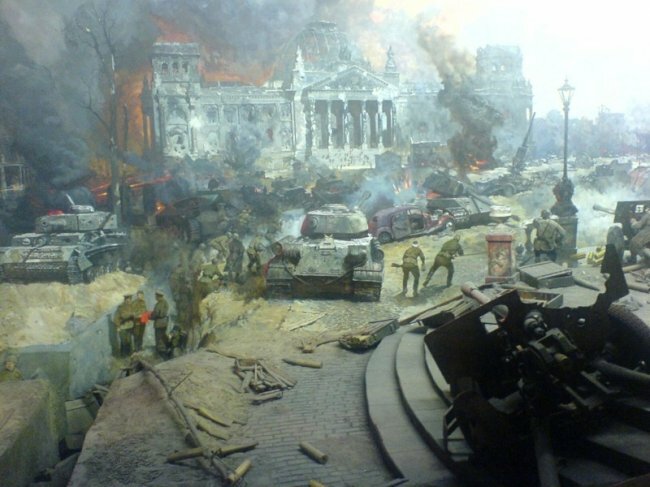
Information